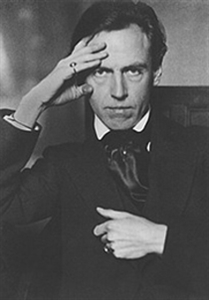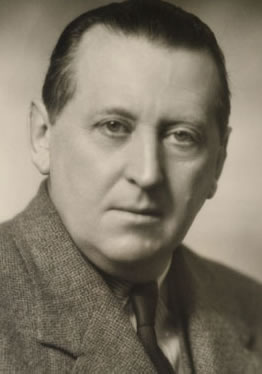Related Research Articles
Paul Creston was an Italian American composer of classical music.
William Jennings Bryan "Ben" Weber was an American composer.
Humphrey Searle was an English composer and writer on music. His music combines aspects of late Romanticism and modernist serialism, particularly reminiscent of his primary influences, Franz Liszt, Arnold Schoenberg and Anton Webern, who was briefly his teacher. As a writer on music, Searle published texts on numerous topics; he was an authority on the music of Franz Liszt, and created the initial cataloguing system for his works.

Cyril Meir Scott was an English composer, writer, poet, and occultist. He created around four hundred musical compositions including piano, violin, cello concertos, symphonies, and operas. He also wrote around 20 pamphlets and books on occult topics and natural health.
D major is a major scale based on D, consisting of the pitches D, E, F♯, G, A, B, and C♯. Its key signature has two sharps. The D major scale is:
D minor is a minor scale based on D, consisting of the pitches D, E, F, G, A, B♭, and C. Its key signature has one flat. Its relative major is F major and its parallel major is D major.
Arnold Atkinson Cooke was a British composer, a pupil of Paul Hindemith. He wrote a considerable amount of chamber music, including five string quartets and many instrumental sonatas, much of which is only now becoming accessible through modern recordings. Cooke also composed two operas, six symphonies and several concertos.

Grigory Samuilovich Frid, also known as Grigori Fried, was a Russian composer of music written in many different genres, including chamber opera.

Edwin York Bowen was an English composer and pianist. Bowen's musical career spanned more than fifty years during which time he wrote over 160 works. As well as being a pianist and composer, Bowen was a talented conductor, organist, violist and horn player. Despite achieving considerable success during his lifetime, many of the composer's works remained unpublished and unperformed until after his death in 1961. Bowen's compositional style is widely considered as ‘Romantic’ and his works are often characterized by their rich harmonic language.

Hans Gál OBE was an Austrian composer, pedagogue, musicologist, and author, who emigrated to the United Kingdom in 1938.
Bernard (George) Stevens was a British composer who first became known to a wider public when he won a newspaper composition prize for a 'Victory Symphony' in post-war 1946. The broader success was not sustained, but Stevens went on to become a respected composer and teacher at the Royal College of Music, using traditional forms for his compositions while extending his essentially tonal harmonic language towards serialism.

Kenneth Leighton was a British composer and pianist. His compositions include church and choral music, pieces for piano, organ, cello, oboe and other instruments, chamber music, concertos, symphonies, and an opera. He had various academic appointments in the Universities of Leeds, Oxford and, primarily, Edinburgh.
Ruth Shaw Wylie was a U.S.-born composer and music educator. She described herself as “a fairly typical Midwestern composer,” pursuing musical and aesthetic excellence but not attracting much national attention: “All good and worthy creative acts do not take place in New York City,” she wrote in 1962, “although most good and worthy rewards for creative acts do emanate from there; and if we can’t all be on hand to reap these enticing rewards we can take solace in the fact that we are performing good deeds elsewhere.” She was among the many twentieth-century American composers whose work contributed to the recognition of American “serious” music as a distinct genre.
Michael Garrett was a British composer, born in Leicestershire. He was active in composing and performing for more than fifty years. His many works extend across a wide range of styles.
Hans Ulrich Engelmann was a German composer.
Carl Frederick Dolmetsch (1911–1997) CBE was a French instrumentalist who specialised in the recorder.
Francis John Routh was an English composer and author.
References
- 1 2 Halstead, Jill (June 1997). The woman composer: creativity and the gendered politics of music composition. Scolar Pr. p. 300. ISBN 1-85928-183-4. ISBN 978-1-85928-183-3
- 1 2 Contemporary Music Review, Vol. 11 Parts 1 and 2, pp. 177-8
- 1 2 Lazarus, Emma; Heine, Heinrich (1881). Antoinette Kirkwood biography. New York: Worthington/University of Massachusetts Amherst . Retrieved 2 February 2012.
- 1 2 3 "Antoinette Kirkwood". Bardic Music. Archived from the original on 3 March 2012. Retrieved 2 February 2012.
- ↑ 'London Concerts: Six Women Composers', in The Musical Times, Vol. 101, No. 1408, June 1960, pp. 373-374
- ↑ Sadie, Julie Anne; Samuel, Rhian (1994). The Norton/Grove dictionary of women composers . New York: W.W. Norton. p. 250 . ISBN 0-393-03487-9.
- ↑ The Times 24 July 1961, p. 12
- ↑ Who's Who in Music, 5th ed. (1969), p. 173
- ↑ Helen Reid. 'For the Love of Richard', Western Daily Press, 1 August 1988, p. 8
- ↑ "Antoinette Kirkwood". Bardic Music. Archived from the original on 3 March 2012. Retrieved 24 December 2010.
- ↑ Marie Fitzpatrick . 'Kirkwood, Antoinette' in Grove Music Online (2001, rev. 2023)
- ↑ "Symphony no. 1". British Music Collection . 17 April 2009.
- ↑ 'Six Women Composers', The Musical Times, Vol. 101, No. 1408 (June 1960), pp. 373-4
- ↑ "Scores by Antoinette Kirkwood". The Collection. Arts Council England. Archived from the original on 19 July 2012. Retrieved 3 February 2012.
- ↑ Included on A Potpourri of Piano Music, Catherine Nardiello, piano, Cassette CN-105
- ↑ extract performed by Gemma Christine Connor
- ↑ Suite for Strings - Antoinette Kirkwood (Estreia Nacional Brasileira)